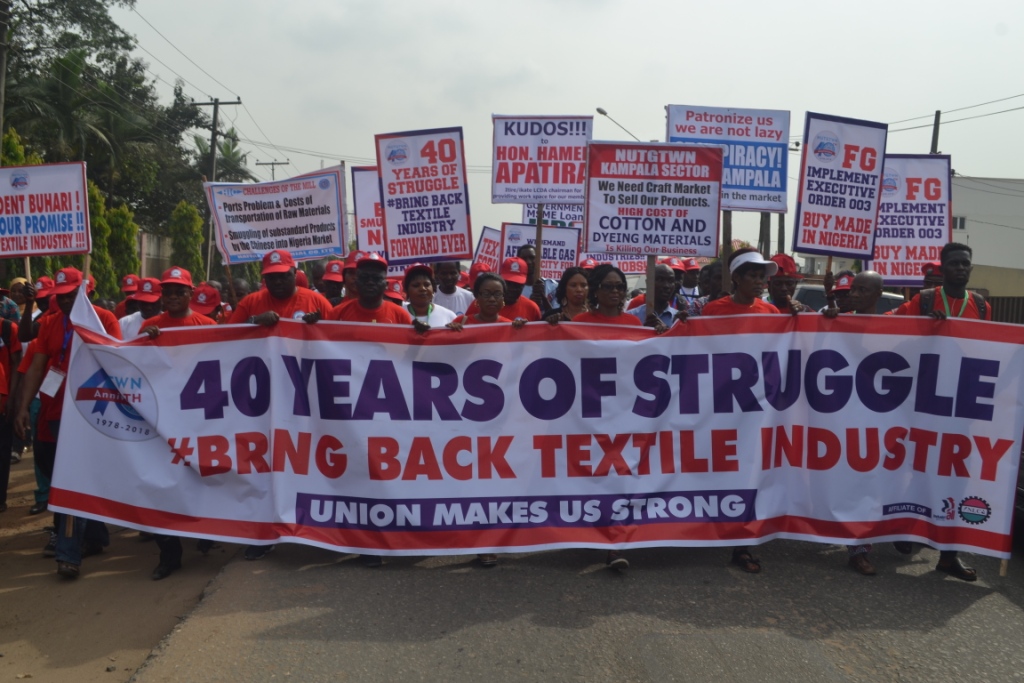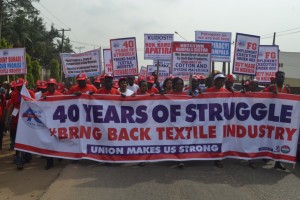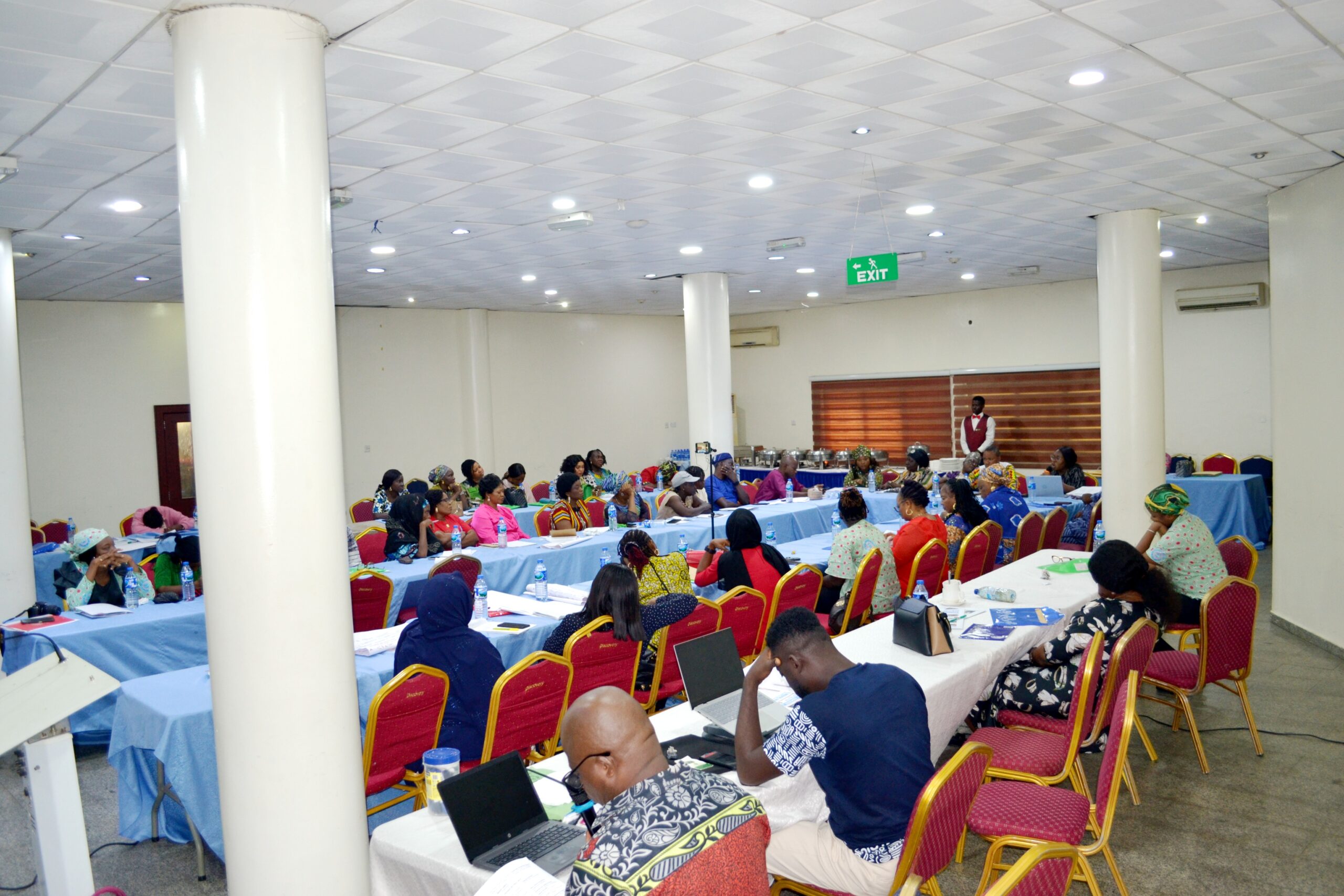
Last Friday at Kakuri in Kaduna, the officials of the union unveiled series of activities to mark the 40th anniversary of the National Union of Textile, Garment and Tailoring Workers of Nigeria (NUTGWN) with the anniversary theme: NUTGTWN @40: Repositioning Labour and Industry for the next 40 Years.
NUTGWN, an affiliate union of Nigeria Labour Congress (NLC), was officially inaugurated as an industrial union at the Lagos city Hall on December 1977. The union however took off over a year later in April 1978, in Lagos, later after the amalgamation of various house unions moved its headquarters to Kaduna being the original home of large integrated textile mills. Certainly the story of unionism in the textile industry is long dated than industrial unionism.

Kaduna Textile Ltd (KTL) is the first textile mill in Nigeria and among the first in independent Africa. It commenced production in 1957. It was a product of Northern regional government-led Industrialization drive. The first house union started here in this period. This is the union why the union symbolically commenced its 40th anniversary from KTL, Kaduna last Friday.
Anniversary automatically confers praise to the founding members of this great union and the pioneer textile industry both dead and living. We salute in particular the founding Sir Ahmadu Bello, Sardauna of Sokoto and the Premier of Northern region and his cabinet members who had the vision of Industrialization and the spirit of catching up with the then relatively economically advanced Southern region. We praise Federal government of Tafawa Balewa, and military regimes of General Gowon, Murtala, Obasanjo and Buhari for keeping textile mills alive. The late Alhaji Abubakar Abutu, citizen of Kogi state and Representative in the Second Republic parliament was the first house union. He was the President of the KTL African workers union formed between 1961/1962. Then in KTL, there was a large number of European senior staff and mechanics.
Thus an African Union was to ensure decent work and non-discrimination among African (Nigerian) workers. At its peak in 1974, KTL employed between 4,000 and 5000 workers. It produced quality grey baft, shirting and printed fabrics. It had the largest installed capacities in spinning and weaving in entire Nigeria. Between 1973/1974 it had as many as 83,000 spindles and 2,700 looms. It produced 9.7 million kg of yarn and 64.4 million meters of cloth. KTL laid the foundation for other Textile Mills in Kaduna totaling some 13 namely KTL, UNTL, Supetex, Unitex, Arewa Textile, Nortex, Finetex, Chellco, Blancket Manufacturing, Zaria Industries, CAP Zaria, World Garment, Poly Fibres, etc. and Nigeria as a whole totalling over 150 employing as many as 80,000 workers by late 80s. In the 80s this historic factory had as many as 112 hectares of farming land in Bida as part of the backward integration project. By 1983, with hundreds of textile mills in Lagos, Kano, Aba and Asaba, Nigeria was the third largest country in textile production in Africa.
Sadly we regret today that KTL which started declining in early 90s has been shutdown almost permanently since 2002 with thousands of workforce laid off and some yet to be fully paid. Many workers are still owed their entitlements by the 19 Northern governors who owned the company while the late Premier Ahmadu Bello successfully ran the factory which employed thousands of workers and paid them promptly.
At anniversary stakeholders in the textile industry should not agonize but organize for the revival of KTL and other Textile mills under lock and key. For one there are lots to celebrate. Despite industrial decline NUTGTWN @40 is a strong trade union that has built structures and capacity in defense of its members. It has produced notable African trade unionists that include the current Chairman of the ruling APC, Comrade Adams Oshihomole. He was the General Secretary of the union and subsequent two-term President of NLC and two term governor of Edo state with enduring legacies. Textile union has signed 48 collective national agreements since 1978, a record achievement in improving the plight of its members.
We today call on the federal and state governments to within the context of Economic Recovery and Growth Plan (ERGP) urgently revive moribund Textile mills in particular and manufacturing industries in general. There must be state-led Industrialization process in collaboration with private capital to consciously add value, create factories and decent mass jobs to engage youths in employment as it was in the beginning.
Nigeria needs good governance as it was like in the 60s that would Make in Nigeria and consume what Nigeria produces, halt capital flight through criminal importation. Northern Nigeria used to be an investment destination as we can see from the closed factories in Kakuri and Nasarawa in Kaduna and Bompai industrial areas in Kano.
In 2019 elections Textile workers and indeed organized labour had rightly served the notice that they would only vote for candidates that are committed to sustainable industrial development and revival of industries. Industry is a key driver of sustainable jobs and development for national economies and the foundation of good living standards.
It does not matter whether it is first industrial revolution, (Industry 1.0), Second Industrial Revolution (2.0) Third Industrial Revolution (Industry 3.0) or the Fourth Industrial Revolution (Industry 4.0), Nigerians must make what we wear such as clothes and textile, create jobs, save foreign exchange on imports. Nigeria has as many as 200 million population. Millions of youths join the labour market annually without jobs making them voluntary slaves to Europe and America after three hundreds Africa put an end to forced slavery.
Only industry can provide sustainable jobs and living wages and necessary revenues for government to provide the needed infrastructure for development. We hail a number of commendable initiatives by Buhari government in promoting wealth generation and reviving the industry, such as Buy Made-in-Nigeria campaign. Buhari government has signed Executive Order (EO3) on Support for Local Content in Public Procurement. It mandates Government agencies to spend more of their budgets on locally produced goods and services. However, KTL and other factories remain closed with many workers out of jobs. There can be no industrialization without electrification. Sustainable industrial policy development requires integrated policy coherence between the different arms of Government; Federal, State and Local governments.
By Issa Aremu, mni | Published Date Oct 14, 2018 23:50 PM






